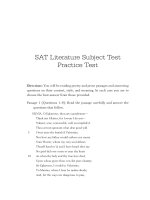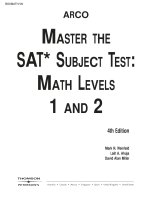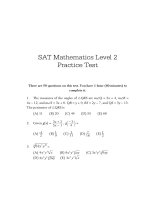SAT Literature Subject Test Practice Test
Bạn đang xem bản rút gọn của tài liệu. Xem và tải ngay bản đầy đủ của tài liệu tại đây (2.18 MB, 52 trang )
SAT Literature Subject Test
Practice Test
Directions: You will be reading poetry and prose passages and answering
questions on their content, style, and meaning. In each case you are to
choose the best answer from those provided.
Passage 1 (Questions 1–8): Read the passage carefully and answer the
questions that follow.
SILVIA. O Eglamour, thou art a gentleman—
Think not I flatter, for I swear I do not—
Valiant, wise, remorseful, well accomplish’d.
Thou art not ignorant what dear good will
5
I bear unto the banish’d Valentine;
Nor how my father would enforce me marry
Vain Thurio, whom my very soul abhors.
Thyself hast lov’d; and I have heard thee say
No grief did ever come so near thy heart
10
As when thy lady and thy true love died,
Upon whose grave thou vow’dst pure chastity.
Sir Eglamour, I would to Valentine,
To Mantua, where I hear he makes abode;
And, for the ways are dangerous to pass,
2
15
SAT Literature Subject Test
I do desire thy worthy company,
Upon whose faith and honour I repose.
Urge not my father’s anger, Eglamour,
But think upon my grief, a lady’s grief,
And on the justice of my flying hence
20
To keep me from a most unholy match,
Which heaven and fortune still rewards with plagues.
I do desire thee, even from a heart
As full of sorrows as the sea of sands,
To bear me company and go with me;
25
If not, to hide what I have said to thee,
That I may venture to depart alone.
(1590–91)
1. Which of the following attributes does Sylvia not ascribe to
Eglamour?
A.courage
B.intelligence
C.conscience
D.talent
E. good will
2. What does Sylvia assure Eglamour that he knows?
A. how much she respects her father
B. how much she loves Thurio
C. how much he resembles Valentine
D. how much she cares for Valentine
E. how sorry she is that he loves her
SAT LITERATURE SUBJECT TEST PRACTICE TEST
3
3. What did Eglamour decide upon his lady’s death?
A. that he now loves Sylvia
B. that he would never love another
C. that he would stay near her grave
D. that he could not grieve any longer
E. that he would act like a gentleman
4. What word is unspoken but understood in line 12?
A.beloved
B.quickly
C.should
D.go
E.promise
5. Why does Sylvia want Eglamour’s company?
A. She loves him.
B. She needs protection.
C. She doesn’t know the way.
D. She feels sorry for him.
E. She plans to deceive her father.
6. What does Sylvia think of the marriage her father has proposed for
her?
A. She prefers Eglamour.
B. She was caught by surprise at the announcement.
C. It would be sinful.
D. It is unjust.
E. She compares it to a plague.
4
SAT Literature Subject Test
7. Lines 22–24 contain an instance of
A. verbal irony.
B.pun.
C.onomatopoeia.
D.oxymoron.
E.hyperbole.
8. What words are omitted from line 25 but understood to be part of
Sylvia’s message nonetheless?
A. to help me
B. I do desire thee
C. to reconsider (and)
D. to defy my father (and)
E. and only thee
Passage 2 (Questions 9–14): Read the passage carefully and answer the
questions that follow.
Mr Slope, as was his custom, asked for Mr Stanhope, and was
told, as was the servant’s custom, that the signora was in the
drawing-room. Upstairs he accordingly went. He found her, as
he always did, lying on her sofa with a French volume before
5
her, and a beautiful little inlaid writing case open on her table.
At the moment of his entrance she was in the act of writing.
‘Ah, my friend,’ said she, putting out her left hand to him
across the desk, ‘I did not expect you to-day and was this very
instant writing to you—’
10Mr Slope, taking the soft fair delicate hand in his, and very
soft and fair and delicate it was, bowed over it his huge red
head and kissed it. It was a sight to see, a deed to record if the
author could fitly do it, a picture to put on canvas. Mr Slope
was big, awkward, cumbrous, and having his heart in his pur15 suit was ill at ease. The lady was fair, as we have said, and delicate; every thing about her was fine and refined; her hand in his
SAT LITERATURE SUBJECT TEST PRACTICE TEST
looked like a rose lying among carrots, and when he kissed it he
looked as a cow might do on finding such a flower among her
food. She was graceful as a couchant goddess, and, moreover, as
20 self-possessed as Venus must have been when courting Adonis.
Oh, that such grace and such beauty should have condescended to waste itself on such a pursuit!
‘I was in the act of writing to you,’ said she, ‘but now my
scrawl may go into the basket;’ and she raised the sheet of
25 gilded note paper from off her desk as though to tear it.
‘Indeed it shall not,’ said he, laying the embargo of half a
stone weight of human flesh and blood upon the devoted paper. ‘Nothing that you write for my eyes, signora, shall be so
desecrated,’ and he took up the letter, put that also among
30 the carrots and fed on it, and then proceeded to read it.
‘Gracious me! Mr Slope,’ said she. ‘I hope you don’t mean to
say that you keep all the trash I write to you. Half my time I don’t
know what I write, and when I do, I know it is only fit for the black
of the fire. I hope you have not that ugly trick of keeping letters.’
35‘At any rate I don’t throw them into a waste-paper basket.
If destruction is their doomed lot, they perish worthily, and
are burnt on a pyre, as Dido was of old.’
‘With a steel pen stuck through them, of course,’ said she,
‘to make the simile more complete. Of all the ladies of my
40 acquaintance I think Lady Dido was the most absurd. Why
did she not do as Cleopatra did? Why did she not take out
her ships and insist on going with him? She could not bear
to lose the land she had got by a swindle; and then she could
not bear the loss of her lover. So she fell between two stools.
45 Mr Slope, whatever you do, never mingle love and business.’
(1857)
5
6
SAT Literature Subject Test
9. The effect of repeating “as was [his] custom” in the first sentence is
A. to show that these people were exceedingly polite.
B. to divert Mr Slope’s attention from the absent Mr Stanhope.
C. to suggest that Mr Slope didn’t really come to see Mr Stanhope.
D. to reveal that the signora had been waiting for Mr Slope to call.
E. to hint that the servant was going to eavesdrop on the conversation between Mr Slope and the signora.
10. The initial image of the signora suggests that she is
A.elegant.
B.lazy.
C.dangerous.
D.asleep.
E. waiting for Mr Slope’s visit.
11. The similes in the third paragraph rely for their effect on
A. visual imagery.
B.hyperbole.
C. situational irony.
D. historical allusion.
E. pathetic fallacy.
12. It is clear that the speaker’s attitude toward Mr Slope is one of
A.admiration.
B.envy.
C.sympathy.
D.ridicule.
E.impatience.
SAT LITERATURE SUBJECT TEST PRACTICE TEST
7
13. What do we learn about the correspondence between the signora
and Mr Slope?
I. She doesn’t really have strong feelings for him.
II. He treasures the letters he receives from her.
III. The letters contain private utterances she would be embarrassed
to see made public.
A. I alone
B. II alone
C. I and II but not III
D. II and III but not I
E. I, II, and III
14. The references to Dido and Cleopatra suggest
A. that the signora foresees her own destruction as a result of her
love affairs.
B. that the signora fancies herself an irresistible woman, much as
they were.
C. that Mr Slope admires women of classic civilizations.
D. that the narrator thinks Mr Slope is a great conqueror like Julius
Caesar.
E. that we readers are to look for allegorical parallels to the story
of the signora and Mr Slope.
Passage 3 (Questions 15–23): Read the passage carefully and answer the
questions that follow.
Announced by all the trumpets of the sky,
Arrives the snow, and, driving o’er the fields,
Seems nowhere to alight: the whited air
Hides hills and woods, the river, and the heaven,
5 And veils the farm-house at the garden’s end.
The sled and traveller stopped, the courier’s feet
Delayed, all friends shut out, the housemates sit
8
SAT Literature Subject Test
Around the radiant fireplace, enclosed
In a tumultuous privacy of storm.
10 Come see the north wind’s masonry.
Out of an unseen quarry evermore
Furnished with tile, the fierce artificer
Curves his white bastions with projected roof
Round every windward stake, or tree, or door.
15 Speeding, the myriad-handed, his wild work
So fanciful, so savage, nought cares he
For number or proportion. Mockingly,
On coop or kennel he hangs Parian wreaths;
A swan-like form invests the hidden thorn;
20 Fills up the farmer’s lane from wall to wall,
Maugre the farmer’s sighs; and at the gate
A tapering turret overtops the work.
And when his hours are numbered, and the world
Is all his own, retiring, as he were not,
25 Leaves, when the sun appears, astonished Art
To mimic in slow structures, stone by stone,
Built in an age, the mad wind’s night-work,
The frolic architecture of snow.
(1835)
15. The metaphor that opens the poem tells us that
A. the clouds are like a symphonic orchestra.
B. the newspapers predicted the snowstorm.
C. there was something majestic in the storm.
D. the storm was as beautiful as music.
E. it snowed a lot that day.
SAT LITERATURE SUBJECT TEST PRACTICE TEST
9
16. The phrase “seems nowhere to alight” (line 3) is illustrated in which
of these details?
I. “hides hills and woods” (line 4)
II. “hides…the river” (line 4)
III. “veils the farm-house at the garden’s end” (line 5)
A. I alone
B. II alone
C. III alone
D. I and II but not III
E. I, II, and III
17. The effect of the snowstorm on the housemates can best be described as
A.inconvenient.
B.dangerous.
C.amusing.
D.isolating.
E.exciting.
18. The “artificer” in line 12 is
A. the wind.
B. a stone mason.
C. a carpenter.
D. a farmer.
E. a sculptor.
19. Lines 15–18 highlight what feature of the power behind the storm?
A. its creativity
B. its beauty
C. its destructiveness
D. its extravagance
E. its timidity
10
SAT Literature Subject Test
20. The wreaths and the swan (lines 18–19) are
A. victims of the snowstorm.
B. the storm’s creations.
C. what the poet felt he had to protect from the storm’s fury.
D. symbols of the winter landscape.
E. reminders of better weather.
21. “Maugre” in line 21 means
A.hearing.
B.echoing.
C. drowning out.
D. in spite of.
E.ridiculing.
22. “Mad” in line 27 means
A.angry.
B.crazy.
C.dangerous.
D. both angry and crazy.
E. both crazy and dangerous.
23. The specific illustrations of the snowstorm’s effects in lines 11–22
prepare the reader for which word in lines 23–28?
A.numbered
B.retiring
C.slow
D.night-work
E.architecture
SAT LITERATURE SUBJECT TEST PRACTICE TEST
11
Passage 4 (Questions 24–28): Read the passage carefully and answer the
questions that follow.
As the day was pleasant, Madame Valmonde drove over to
L’Abri to see Desirée and the baby.
It made her laugh to think of Desirée with a baby. Why, it
seemed but yesterday that Desirée was little more than a baby
5
herself; when Monsieur in riding through the gateway of
Valmonde had found her lying asleep in the shadow of the big
stone pillar.
The little one awoke in his arms and began to cry for “Dada.”
That was as much as she could do or say. Some people thought
10 she might have strayed there of her own accord, for she was of
the toddling age. The prevailing belief was that she had been purposely left by a party of Texans, whose canvas-covered wagon,
late in the day, had crossed the ferry that Coton Mais kept, just
below the plantation. In time Madame Valmonde abandoned
15 every speculation but the one that Desirée had been sent to
her by a beneficent Providence to be the child of her affection,
seeing that she was without child of the flesh. For the girl grew
to be beautiful and gentle, affectionate and sincere—the idol
of Valmonde.
20It was no wonder, when she stood one day against the stone
pillar in whose shadow she had lain asleep, eighteen years before, that Armand Aubigny riding by and seeing her there, had
fallen in love with her. That was the way all the Aubignys fell
in love, as if struck by a pistol shot. The wonder was that he
25 had not loved her before; for he had known her since his father
brought him home from Paris, a boy of eight, after his mother
died there. The passion that awoke in him that day, when he
saw her at the gate, swept along like an avalanche, or like a prairie fire, or like anything that drives headlong over all obstacles.
30Monsieur Valmonde grew practical and wanted things well
considered: that is, the girl’s obscure origin. Armand looked
12
SAT Literature Subject Test
into her eyes and did not care. He was reminded that she was
nameless. What did it matter about a name when he could
give her one of the oldest and proudest in Louisiana? He
35 ordered the corbeille from Paris, and contained himself with
what patience he could until it arrived; then they were married.
(1893)
24. The flashback at the beginning of the passage takes the reader back
about how many years?
A. no more than five
B. probably around fifteen
C. probably around twenty
D. at least thirty
E. It is impossible for a reader to determine.
25. What does Madame believe to be the cause of this baby appearing
near her gateway?
A. The baby was abandoned by traveling Texans.
B. The baby wandered over from another plantation.
C. The baby was left by a poor family who couldn’t care for it.
D. The baby was a gift from Heaven.
E. Madame just accepts the baby without any concern for her
origin.
26. Why does Madame accept the baby so willingly?
A. She had no other children.
B. She was basically a generous and loving person.
C. The baby was beautiful.
D. The baby spoke to her when she was found.
E. Her husband wanted her to.
SAT LITERATURE SUBJECT TEST PRACTICE TEST
13
27. Armand’s falling in love with Desirée is described with images of
A.summer.
B.violence.
C.animals.
D.sweetness.
E.beauty.
28. Why might Monsieur Valmonde advise Armand to proceed with
caution when he considers marrying Desirée?
A. Desirée is so young.
B. Desirée is loved by many men.
C. Desirée has a baby of her own.
D. Desirée does not love Armand.
E. Desirée’s family might not be honorable.
Passage 5 (Questions 29–33): Read the passage carefully and answer the
questions that follow.
Behold her, single in the field,
Yon solitary Highland Lass!
Reaping and singing by herself;
Stop here, or gently pass!
5 Alone she cuts and binds the grain,
And sings a melancholy strain;
O listen! for the Vale profound
Is overflowing with the sound.
No Nightingale did ever chaunt
10 More welcome notes to weary bands
Of travellers in some shady haunt,
Among Arabian sands:
A voice so thrilling ne’er was heard
In spring-time from the Cuckoo-bird,
14
SAT Literature Subject Test
15 Breaking the silence of the seas
Among the farthest Hebrides.
Will no one tell me what she sings?—
Perhaps the plaintive numbers flow
For old, unhappy, far-off things,
20 And battles long ago:
Or is it some more humble lay,
Familiar matter of to-day?
Some natural sorrow, loss, or pain,
That has been, and may be again?
25 Whate’er the theme, the Maiden sang
As if her song could have no ending;
I saw her singing at her work,
And o’er the sickle bending;—
I listened, motionless and still;
30 And, as I mounted up the hill
The music in my heart I bore,
Long after it was heard no more.
(1807)
29. What does “single” in line 1 mean?
A.lone
B.unmarried
C.unique
D.musical
E.sad
SAT LITERATURE SUBJECT TEST PRACTICE TEST
15
30. Why does the speaker urge the listener to pass “gently”?
A. so as not to scare the animals
B. in order to move quickly
C. so that the girl will not be disturbed
D. so that his (the speaker’s) view of the girl won’t be blocked
E. so that he (the speaker) can be alone with the girl
31. What is the function of stanza two?
A. It employs standard poetic devices of the period.
B. It transports the reader to faraway lands.
C. It delays the speaker’s realization of what this moment means
to him.
D. It communicates how lovely the woman’s voice is.
E. It provides artistic contrast to the scene in stanza one.
32. Why does the speaker pose a series of questions in stanza 3?
A. He wants to engage the listener in conversation.
B. He knows the answers, but he wants the reader to figure them
out for him- or herself.
C. He is trying to find out what the woman is saying.
D. He is gathering his own audience.
E. He is actually singing his own song.
33. Which of these is likely to be a remark the speaker makes to a friend
the day after seeing the Highland lass in the field?
A. I saw this really pretty girl working in the field yesterday.
B. I am still uplifted by this beautiful song I heard yesterday.
C. I was enjoying myself walking in the country. I wish you had
been with me.
D. There’s a lot of beautiful scenery not far from here.
E. I would have enjoyed the moment more if I had understood
what she was singing about.
16
SAT Literature Subject Test
Passage 6 (Questions 34–43): Read the passage carefully and answer the
questions that follow.
And so, at eight ten, Rickie put on his cap and gown,—hitherto symbols of pupilage, now to be symbols of dignity,—the
very cap and gown that Widdrington had so recently hung
upon the college fountain. Herbert, similarly attired, was
5
waiting for him in their private dining-room, where also sat
Agnes, ravenously devouring scrambled eggs. “But you’ll wear
your hoods,” she cried. Herbert considered, and then said she
was quite right. He fetched his white silk, Rickie the fragment
of rabbit’s wool that marks the degree of B.A. Thus attired,
10 they proceeded through the baize door. They were a little late,
and the boys, who were marshalled in the preparation room,
were getting uproarious. One, forgetting how far his voice carried, shouted, “Cave! Here comes the Whelk.” And another
young devil yelled, “The Whelk’s brought a pet with him!”
15“You mustn’t mind,” said Herbert kindly. “We masters make a point of never minding nicknames—unless, of
course, they are applied openly, in which case a thousand
lines is not too much.” Rickie assented, and they entered the
preparation room just as the prefects had established order.
20Here Herbert took his seat on a high-legged chair, while Rickie,
like a queen-consort, sat near him on a chair with somewhat
shorter legs. Each chair had a desk attached to it, and Herbert
flung up the lid of his, and then looked round the preparation
room with a quick frown, as if the contents had surprised him.
25 So impressed was Rickie that he peeped sideways, but could only
see a little blotting-paper in the desk. Then he noticed that the
boys were impressed too. Their chatter ceased. They attended.
•••
“School,” said Mr. Pembroke, slowly closing the lid of the desk,—
“school is the world in miniature.” Then he paused, as a man
SAT LITERATURE SUBJECT TEST PRACTICE TEST
30 well may who has made such a remark. It is not, however, the
intention of this work to quote an opening address. Rickie, at all
events, refused to be critical: Herbert’s experience was far greater
than his, and he must take his tone from him. Nor could any one
criticize the exhortations to be patriotic, athletic, learned, and
35 religious, that flowed like a four-part fugue from Mr. Pembroke’s
mouth. He was a practised speaker—that is to say, he held his
audience’s attention. He told them that this term, the second
of his reign, was THE term for Dunwood House; that it behooved every boy to labour during it for his house’s honour, and,
40 through the house, for the honour of the school. Taking a wider
range, he spoke of England, or rather of Great Britain, and of her
continental foes. Portraits of empire-builders hung on the wall,
and he pointed to them. He quoted imperial poets. He showed
how patriotism had broadened since the days of Shakespeare,
45 who, for all his genius, could only write of his country as—
“This fortress built by nature for herself
Against infection and the hand of war,
This hazy breed of men, this little world,
This precious stone set in the silver sea.”
50And it seemed that only a short ladder lay between the preparation room and the Anglo-Saxon hegemony of the globe. Then
he paused, and in the silence came “sob, sob, sob,” from a little
boy, who was regretting a villa in Guildford and his mother’s
half acre of garden.
(1907)
17
18
SAT Literature Subject Test
34. The opening paragraphs suggest that
A. Herbert is more experienced in this activity than Rickie.
B. Herbert and Agnes rarely agree.
C. the boys like Rickie more than they like Herbert.
D. Herbert takes his responsibilities seriously, but Rickie does not.
E. Rickie does not want to be there.
35. Herbert treats Rickie
A. as his subordinate.
B. with disdain.
C.nicely.
D. as though Rickie were like his pet.
E.deferentially.
36. In the context of the second paragraph, the word “kindly” functions
both
A. literally and hyperbolically.
B. literally and ironically.
C. ironically and metaphorically.
D. ironically and allusively.
E. metaphorically and literally.
37. What is the effect of Herbert opening the lid of his desk?
I. He gets the boys to quiet down.
II. He intimidates Rickie.
III. He finds the paper he was looking for.
A. I alone
B. II alone
C. I and II but not III
D. I and III but not II
E. II and III but not I
SAT LITERATURE SUBJECT TEST PRACTICE TEST
19
38. “Attended” at the end of paragraph three means
A. came in.
B. paid admission.
C.listened.
D.applauded.
E. stood stiffly and respectfully.
39. The first two sentences of the fourth paragraph communicate what
tone?
A. Herbert’s (Mr. Pembroke’s) pride in his school
B. Herbert’s worry about the state of the world
C. Herbert’s dismay about the boys’ behavior
D. The narrator’s amusement about Herbert’s speech
E. The narrator’s respect for Herbert’s vision
40. We can characterize Herbert’s speech as
A. critical of his audience.
B. enthusiastic about his own life and prospects.
C. instructive about how the students should live their lives.
D. cautionary about the obstacles in the students’ futures.
E. supportive of the students and their attempts to be successful.
41. Rickie’s response to Herbert’s speech is
A.approving.
B.satirical.
C.critical.
D.rapt.
E.envious.
20
SAT Literature Subject Test
42. Herbert’s arguments are mostly
A.economic.
B.patriotic.
C.historical.
D. shame inducing.
E.personal.
43. Herbert mentions Shakespeare in order to
A. show how educated he is.
B. invoke the glory of the Elizabethan period.
C. show how much more people of his own day love their country
than Shakespeare had.
D. remind the boys of the reason they had studied Shakespeare in
their English classes.
E. remind the boys that they are English.
Passage 7 (Questions 44–51): Read the passage carefully and answer the
questions that follow.
I doubt not God is good, well-meaning, kind,
And did He stoop to quibble could tell why
The little buried mole continues blind,
Why flesh that mirrors Him must some day die,
5 Make plain the reason tortured Tantalus
Is baited by the fickle fruit, declare
If merely brute caprice dooms Sisyphus
To struggle up a never-ending stair.
Inscrutable His ways are, and immune
10 To catechism by a mind too strewn
With petty cares to slightly understand
What awful brain compels His awful hand.
Yet do I marvel at this curious thing:
To make a poet black, and bid him sing!
(1925)
SAT LITERATURE SUBJECT TEST PRACTICE TEST
21
44. The first line derives some of its poetic effect from
A. its internal rhyme.
B. its classical allusion.
C. its missing conjunction.
D. its unconventional punctuation.
E. its first person presentation.
45. “And did He stoop to quibble” in the second line could be paraphrased to say
A. “and God bent down to argue with me”
B. “and if God came to my level and argued with me”
C. “and I wonder if God would bend down and argue with me”
D. “and God ceased what He was doing to argue with me”
E. “and God ceased to argue with me”
46. The speaker suggests that he does not understand all of the following realities of life except:
A. why some lives are more difficult than others.
B. why people don’t live forever.
C. why some people suffer eternal punishment.
D. why the world is full of beautiful things that we cannot have.
E. if some people’s fates are determined by reason or by chance.
47. An unstated but nonetheless persistent motif in the development of
the first eight lines is
A.animals.
B.torture.
C.light.
D. the underworld.
E. Greek mythology
22
SAT Literature Subject Test
48. “Immune” in line 9 means
A. free of disease.
B. can’t be found guilty.
C. beyond comprehension.
D. not subject to.
E.obliged.
49. The description of human beings in lines 9 through 12 suggests that
people are
A. accustomed to suffering.
B. concerned with less significant matters.
C. generally offensive in God’s sight.
D. no better than blind moles.
E. given to misunderstanding.
50. When the poet uses the word “awful” twice in line 12, which of
the following statements most accurately explains the effect of
the repetition?
A. The word means “awe-inspiring” in both cases.
B. In the first instance the word means “full of awe” and in the
second it means “horrible.”
C. In the first instance the word means “terrifying” and in the second it means “dangerously powerful.”
D. In the first instance the word means “behaving meanly” and in
the second it means “of poor quality.”
E. The word means “inferior” in both cases.
SAT LITERATURE SUBJECT TEST PRACTICE TEST
23
51. What is implied in the poem’s final two lines?
A. The speaker is angry that he is black.
B. The speaker is proud of his beautiful voice.
C. The speaker sees his poetic talent as one of God’s inexplicable
decisions.
D. Writing poetry can make a person feel better about life’s unfair
conditions.
E. Even though he was born into poverty, the poet made a good
life for himself by exploiting his ability.
Passage 8 (Questions 52–60): Read the passage carefully and answer the
questions that follow.
[Winterbourne, a wealthy young American living in Switzerland,
has just met Daisy Miller and her young brother. The Millers are
another wealthy American family who are traveling in Europe. This
kind of traveling was often a part of a young lady’s education.]
The young lady inspected her flounces and smoothed her ribbons again; and Winterbourne presently risked an observation
upon the beauty of the view. He was ceasing to be embarrassed,
for he had begun to perceive that she was not in the least embar-
5
rassed herself. There had not been the slightest alteration in her
charming complexion; she was evidently neither offended nor
flattered. If she looked another way when he spoke to her, and
seemed not particularly to hear him, this was simply her habit,
her manner. Yet, as he talked a little more and pointed out some
10 of the objects of interest in the view, with which she appeared
quite unacquainted, she gradually gave him more of the benefit
of her glance; and then he saw that this glance was perfectly
direct and unshrinking. It was not, however, what would have
24
SAT Literature Subject Test
been called an immodest glance, for the young girl’s eyes were
15 singularly honest and fresh. They were wonderfully pretty eyes;
and, indeed, Winterbourne had not seen for a long time anything
prettier than his fair countrywoman’s various features—her
complexion, her nose, her ears, her teeth. He had a great relish
for feminine beauty; he was addicted to observing and analyzing
20 it; and as regards this young lady’s face he made several observations. It was not at all insipid, but it was not exactly expressive;
and though it was eminently delicate, Winterbourne mentally
accused it—very forgivingly—of a want of finish. He thought it
very possible that Master Randolph’s sister was a coquette; he
25 was sure she had a spirit of her own; but in her bright, sweet,
superficial little visage there was no mockery, no irony. Before
long it became obvious that she was much disposed toward
conversation. She told him that they were going to Rome for
the winter—she and her mother and Randolph. She asked him
30 if he was a “real American”; she shouldn’t have taken him for
one; he seemed more like a German—this was said after a little
hesitation—especially when he spoke. Winterbourne, laughing,
answered that he had met Germans who spoke like Americans,
but that he had not, so far as he remembered, met an American
35 who spoke like a German. Then he asked her if she should not
be more comfortable in sitting upon the bench which he had
just quitted. She answered that she liked standing up and walking about; but she presently sat down. She told him she was from
New York State—“if you know where that is.” Winterbourne
40 learned more about her by catching hold of her small, slippery
brother and making him stand a few minutes by his side.
“Tell me your name, my boy,” he said.
“Randolph C. Miller,” said the boy sharply. “And I’ll tell you
her name”; and he leveled his alpenstock at his sister.
45“You had better wait till you are asked!” said this young
lady calmly.
SAT LITERATURE SUBJECT TEST PRACTICE TEST
“I should like very much to know your name,” said Winterbourne.
“Her name is Daisy Miller!” cried the child. “But that isn’t her
real name; that isn’t her name on her cards.”
50“It’s a pity you haven’t got one of my cards!” said Miss Miller.
“Her real name is Annie P. Miller,” the boy went on.
“Ask him HIS name,” said his sister, indicating Winterbourne.
But on this point Randolph seemed perfectly indifferent; he
continued to supply information with regard to his own family.
55 “My father’s name is Ezra B. Miller,” he announced. “My father ain’t in Europe; my father’s in a better place than Europe.”
Winterbourne imagined for a moment that this was the
manner in which the child had been taught to intimate that
Mr. Miller had been removed to the sphere of celestial
60 reward. But Randolph immediately added, “My father’s in
Schenectady. He’s got a big business. My father’s rich, you bet!”
“Well!” ejaculated Miss Miller, lowering her parasol and looking at the embroidered border. Winterbourne presently released the child, who departed, dragging his alpenstock along
65 the path. “He doesn’t like Europe,” said the young girl. “He
wants to go back.”
“To Schenectady, you mean?”
“Yes; he wants to go right home. He hasn’t got any boys here.
There is one boy here, but he always goes round with a teacher;
70 they won’t let him play.”
“And your brother hasn’t any teacher?” Winterbourne inquired.
“Mother thought of getting him one, to travel round with us.
There was a lady told her of a very good teacher; an American
lady—perhaps you know her—Mrs. Sanders. I think she came
75 from Boston. She told her of this teacher, and we thought of
getting him to travel round with us. But Randolph said he didn’t
want a teacher traveling round with us. He said he wouldn’t
have lessons when he was in the cars. And we ARE in the cars
about half the time. There was an English lady we met in the
25









